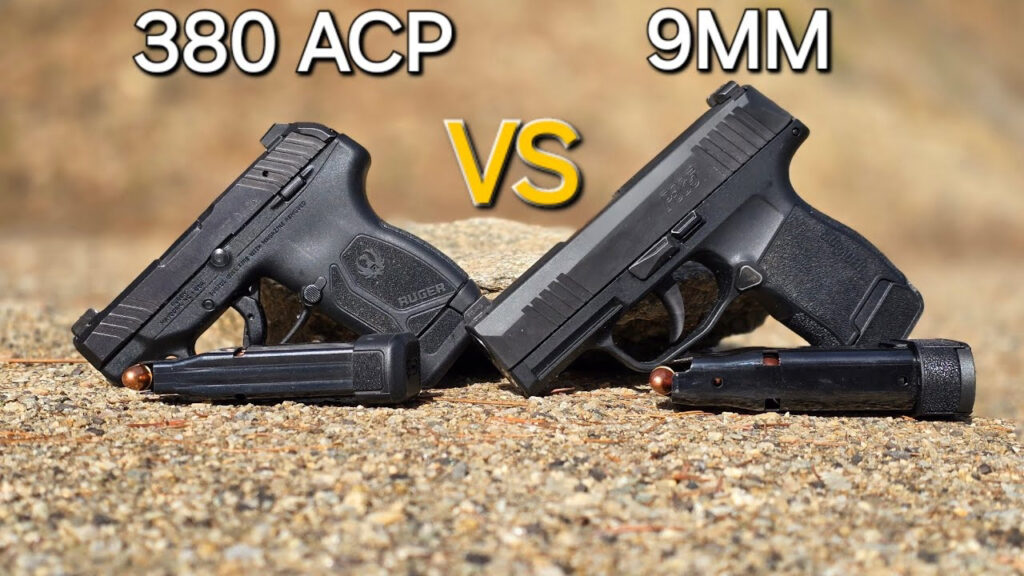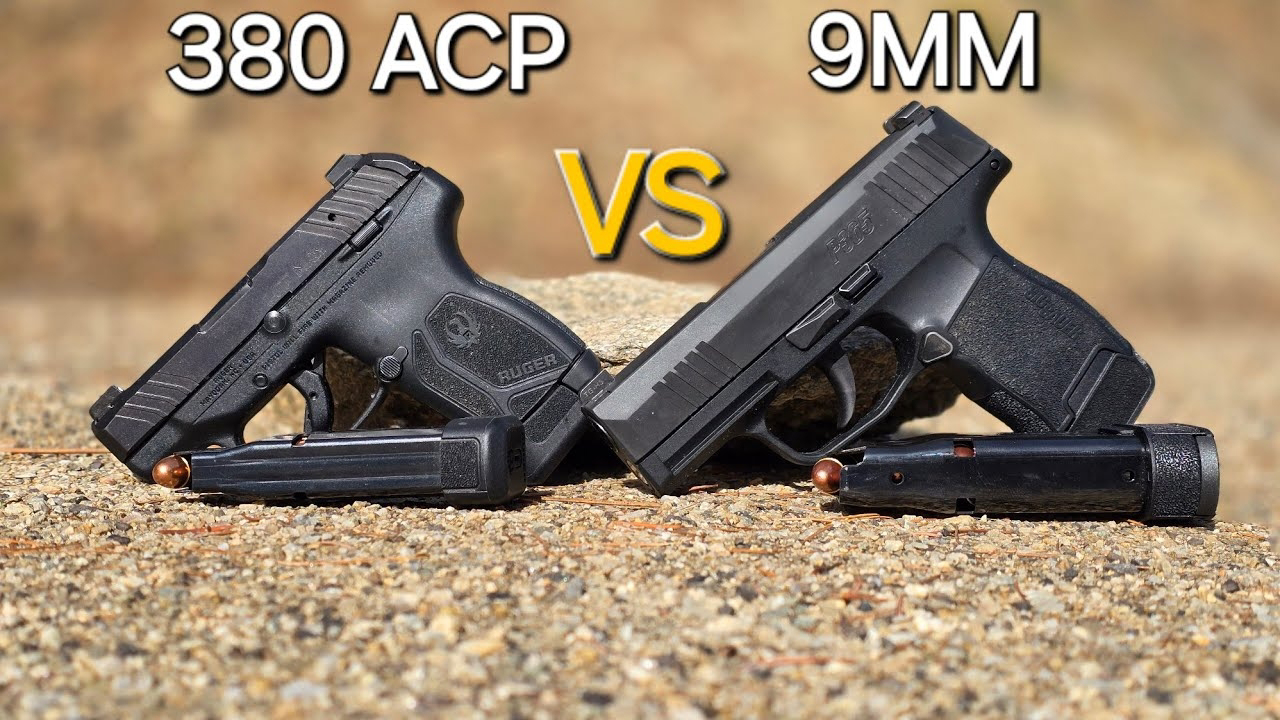
9mm vs .380: A Comprehensive Ballistics Comparison
The debate between the 9mm and .380 ACP (Automatic Colt Pistol) cartridges is a long-standing one, often revisited by both seasoned firearm enthusiasts and those new to the world of self-defense. Both cartridges offer distinct advantages and disadvantages, making the ‘best’ choice highly dependent on individual needs and priorities. This article provides a comprehensive comparison of the 9mm vs .380, examining their ballistics, recoil, size, and suitability for various applications.
Understanding the Cartridges: 9mm and .380 ACP
Before diving into a detailed comparison, it’s essential to understand the basics of each cartridge.
The 9mm Luger
The 9mm, also known as 9x19mm or 9mm Luger, is a centerfire pistol cartridge developed in 1901 by Georg Luger. It quickly gained popularity due to its balance of manageable recoil, relatively high capacity, and effective stopping power. The 9mm is widely used by law enforcement, military personnel, and civilians alike, making it one of the most popular handgun cartridges in the world. Its versatility allows it to be chambered in a wide range of firearms, from compact pistols to carbines.
The .380 ACP
The .380 ACP, also known as 9mm Short or 9x17mm, was designed by John Browning and introduced by Colt in 1908. It’s a smaller and less powerful cartridge than the 9mm, primarily intended for use in compact, lightweight pistols. The .380 ACP offers significantly reduced recoil compared to the 9mm, making it a popular choice for individuals with smaller hands or those sensitive to recoil. However, its reduced size also translates to lower velocity and energy.
Ballistic Performance: Velocity, Energy, and Trajectory
One of the most critical factors in comparing the 9mm vs .380 is their ballistic performance. Ballistics encompasses several key measurements, including velocity, energy, and trajectory. These factors directly impact the cartridge’s effectiveness in terms of stopping power and range.
Velocity
Velocity refers to the speed of the bullet as it travels through the air. Generally, higher velocity translates to greater energy and a flatter trajectory. A typical 9mm round, such as a 115-grain bullet, can achieve velocities of around 1150-1200 feet per second (fps) from a standard pistol barrel. In contrast, a .380 ACP round, such as a 90-grain bullet, typically achieves velocities of around 900-1000 fps. This difference in velocity contributes significantly to the 9mm’s superior energy.
Energy
Energy, measured in foot-pounds (ft-lbs), represents the amount of force the bullet carries. Higher energy bullets are more likely to inflict significant damage upon impact. A 9mm round typically delivers around 350-400 ft-lbs of energy, while a .380 ACP round delivers around 200-250 ft-lbs. The 9mm, therefore, possesses a considerable advantage in terms of energy transfer.
Trajectory
Trajectory refers to the path of the bullet as it travels through the air. Higher velocity bullets tend to have flatter trajectories, meaning they drop less over a given distance. While both the 9mm and .380 ACP are primarily intended for short-range use, the 9mm’s higher velocity gives it a flatter trajectory, making it slightly more accurate and effective at longer ranges. This is, however, not the primary purpose of either cartridge; both are designed for close-quarters self-defense.
Recoil: Manageability and Control
Recoil is the backward force felt by the shooter when a firearm is discharged. Manageable recoil is crucial for maintaining accuracy and control, especially during rapid fire. This is another key area when comparing the 9mm vs .380.
9mm Recoil
The 9mm is known for having moderate recoil. While not excessive, it can be challenging for some shooters, particularly those with smaller hands or limited upper body strength. Proper grip and shooting technique are essential for managing 9mm recoil effectively.
.380 ACP Recoil
The .380 ACP offers significantly reduced recoil compared to the 9mm. This makes it a more comfortable and manageable option for a wider range of shooters, including those who may be sensitive to recoil or have difficulty controlling larger firearms. The lower recoil also allows for faster follow-up shots, potentially increasing the shooter’s effectiveness in a self-defense situation.
Size and Concealability
Concealability is a crucial consideration for individuals who carry a firearm for self-defense. The size and weight of the firearm directly impact its ease of concealment and comfort when carried for extended periods. When considering 9mm vs .380, this is a significant factor.
9mm Pistols
9mm pistols are available in a wide range of sizes, from compact models suitable for concealed carry to full-size models designed for duty use or competition. While compact 9mm pistols are generally larger than .380 ACP pistols, advancements in firearm design have resulted in some incredibly small and lightweight 9mm options.
.380 ACP Pistols
.380 ACP pistols are typically smaller and lighter than 9mm pistols. This makes them exceptionally easy to conceal, even in lightweight clothing. The smaller size also makes them more comfortable to carry for extended periods, increasing the likelihood that individuals will consistently carry their firearm. The trade-off, of course, is less power. [See also: Best Concealed Carry Pistols]
Capacity and Ammunition Availability
Magazine capacity and ammunition availability are also important considerations. Higher capacity magazines offer more rounds for self-defense, while widespread ammunition availability ensures that you can easily find and purchase ammunition when needed.
9mm Capacity and Availability
9mm pistols typically have higher magazine capacities than .380 ACP pistols. Standard capacity magazines for 9mm pistols often hold 10-17 rounds, while extended magazines can hold even more. 9mm ammunition is also widely available and relatively inexpensive, making it a cost-effective choice for practice and training.
.380 ACP Capacity and Availability
.380 ACP pistols generally have lower magazine capacities than 9mm pistols, typically holding 6-8 rounds in a standard magazine. While .380 ACP ammunition is readily available, it is often more expensive than 9mm ammunition. This can make it less cost-effective for frequent practice.
Stopping Power and Self-Defense Applications
The ultimate purpose of a self-defense firearm is to stop a threat effectively. Stopping power is a complex concept influenced by several factors, including bullet size, velocity, energy, and bullet design. The debate over 9mm vs .380 often centers around this critical aspect.
9mm Stopping Power
The 9mm is generally considered to have superior stopping power compared to the .380 ACP. Its higher velocity and energy translate to greater penetration and more significant tissue damage. While shot placement is always paramount, the 9mm’s greater power provides a margin of error, increasing the likelihood of incapacitating an attacker. [See also: Effective Self-Defense Tactics]
.380 ACP Stopping Power
The .380 ACP has less stopping power than the 9mm. While it can certainly be lethal, its lower velocity and energy may not always be sufficient to immediately incapacitate an attacker. This means that multiple shots may be necessary to stop a threat effectively. However, modern .380 ACP ammunition with improved bullet designs can enhance its stopping power to some extent.
Choosing the Right Cartridge: Key Considerations
Ultimately, the choice between the 9mm vs .380 depends on individual needs and priorities. Here are some key considerations to help you make the right decision:
- Recoil Sensitivity: If you are sensitive to recoil or have difficulty controlling larger firearms, the .380 ACP may be a better choice.
- Concealability: If concealability is your primary concern, a smaller .380 ACP pistol may be more suitable.
- Stopping Power: If you prioritize stopping power, the 9mm offers a significant advantage.
- Training and Practice: Choose the cartridge that you can comfortably and affordably practice with regularly.
- Firearm Availability: Consider the availability and cost of firearms chambered in each cartridge.
Conclusion: 9mm vs .380 – A Personal Choice
The 9mm vs .380 debate is unlikely to be resolved definitively. Both cartridges have their strengths and weaknesses, and the best choice depends on individual circumstances. The 9mm offers superior power and capacity, while the .380 ACP provides greater concealability and reduced recoil. By carefully considering your needs and priorities, you can make an informed decision and choose the cartridge that is best suited for your self-defense needs. Remember to always prioritize safety, proper training, and responsible gun ownership, regardless of the cartridge you choose.

